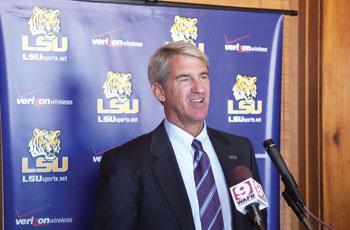The Southeastern Conference didn’t make any friends around Baton Rouge this weekend.
School presidents voted Sunday to stay with the league’s current eight-game conference schedule format, including permanent cross-division opponents. The decision included a mandate that each team must schedule at least one non-conference opponent from one of the other four BCS conferences each season starting in 2016.
Since the decision came down, LSU athletic director Joe Alleva and coach Les Miles have blasted it to anyone who would listen as unfair and biased toward the interests of individual schools.
LSU has played Florida every season since 1971, and the duo of top Tigers have a legitimate gripe — especially when directly comparing their team’s schedule to Alabama’s. Hint: That probably came up in the meetings.
Forget the fact that the LSU brass may change its tune in the somewhat-unlikely event that Florida’s down season turned into a full-on slump — or Tennessee re-established itself as a national power — the criticism is dead-on.
In a league with the depth and resources of the SEC, there’s no reason for teams not to play a rotating, equitable conference schedule. A conference of schools perennially appearing in the national championship race should let the teams run on an even track.
While Alleva did not get what he wants on the scheduling issue, he may have parlayed his discontent into a pretty sweet consolation prize.
In a letter to Tiger fans posted on LSU athletics’ official website, Alleva wrote that after initiating conversations with SEC commissioner Mike Slive, he had “developed an understanding that CBS, ESPN and all its platforms will recognize the importance of LSU home night games in their scheduling process with assurances that every effort will be made to maximize the number of LSU home games at night.”
It sounds like a new twist has been put on Patrick Henry’s famous speech around Birmingham this weekend:
“There’s no need to give the Tigers scheduling liberty, just be sure to give their fans vague promises of Saturday Nights in Death Valley.”
The announcement is a major face-saver for Alleva, especially because his fan base has groaned loudly for years about television considerations forcing most of LSU’s biggest home games to be played during the day.
LSU fans may take this as a bigger win than scheduling reform would have been. After all, good teams beat other good teams, and whining about the schedule has never been the LSU-way.
What kind of Miles-coached team wouldn’t have a great want to beat any and all quality opponents lined up against it? Lobbying for an easier schedule feels like more of an Ohio State move.
So all in all, Baton Rouge will see Alleva’s week as a success — assuming the television networks live up to their end of the bargain.
For now, it’s an easy promise for CBS and ESPN to make. The Tigers currently have a fluid quarterback situation, almost no experienced skill-position players and a defense that was bad most of last season.
LSU may not be that good this season, and with a home slate that is dreadful until Ole Miss and Alabama visit late in the season, the networks may deliver on those assurances because they don’t really care where or when the games are broadcast.
But if LSU surprises and comes out of the gate hot once again, this whole thing will get way more interesting.
Let’s say LSU crushes Wisconsin in the nationally televised season opener before running roughshod through the first month of the season. Then, imagine LSU goes on the road and knocks off Auburn, Florida or both, particularly if ultra-hyped freshmen Leonard Fournette and Malachi Dupre are already playing like the stars people think they will be.
There’s little America likes more than a young phenom, and such an LSU team would get monster TV ratings.
So if CBS has the option to broadcast LSU’s home games against Ole Miss and Alabama — two rivals with big-time young players of their own — but the only time slot it has is 2:30 p.m., there is no chance CBS lets ESPN or any of its platforms take the game, especially if the only thing holding it back was spring-time assurances it made to a squeaky wheel that the game would be played at night.
It doesn’t matter if Alleva and the network executives had a blood oath, pinky promises or flew back to Baton Rouge to swear on the almighty Bronze Tiger, those unwritten agreements will go out the window the second they become financially disadvantageous.
The better the Tigers are in 2014, the more likely that is to happen. That being said, another age-old phrase comes to mind:
Always get it in writing.
James Moran is a 21-year-old mass communication senior from Beacon, N.Y.
Be skeptical of Alleva’s night game assurances
By James Moran
April 29, 2014

Athletic Director Joe Alleva speaks about Fall Practice at a Walk-On’s media briefing on Thursday
More to Discover





